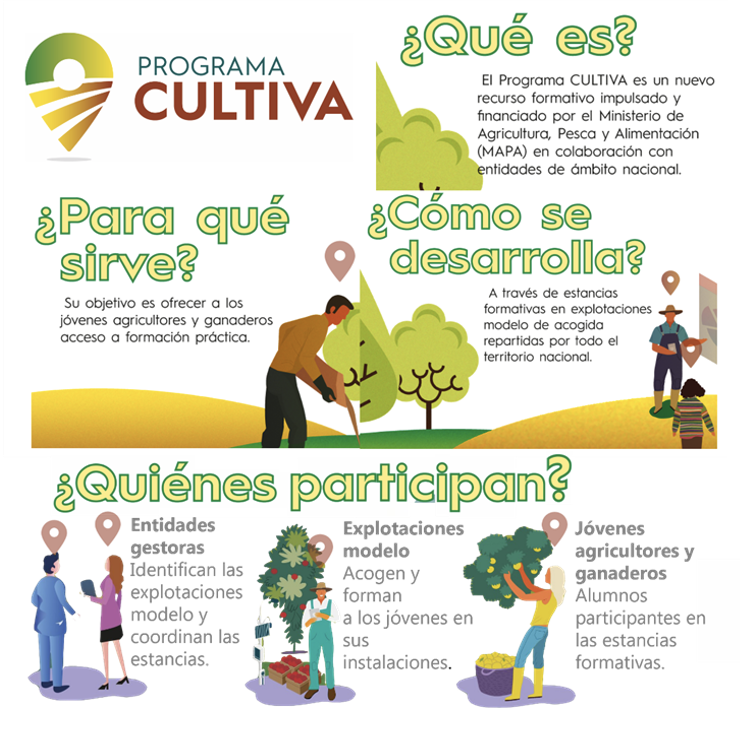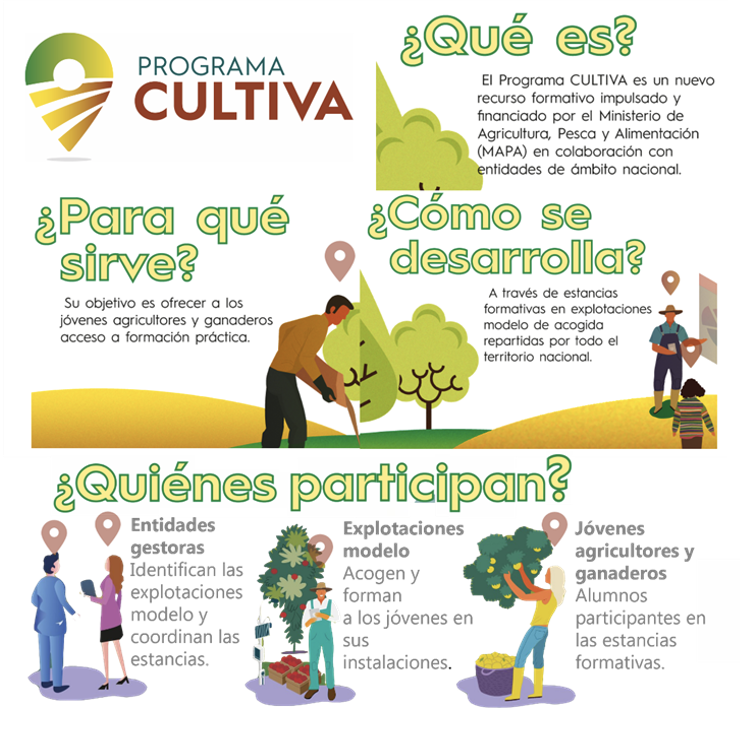2024
training
peer-to-peer learning
training for farmers
study visits

Rural areas across Spain are experiencing an aging population, with fewer young people choosing to take up farming as a profession. The agricultural sector faces additional hurdles, such as the need to modernize farming practices to address environmental sustainability, climate change, and market competitiveness. To secure the future of agriculture, it is vital to support the next generation of farmers by providing them with access to modern techniques, innovation, and knowledge-sharing platforms.
In this perspective, the AKIS strategy can contribute developing a system capacity which help young farmers dealing with the increasingly complex challenges of the agricultural, agri-food, and forestry sectors through engaging in more appropriate holistic approaches to business management. Beyond strengthening knowledge and skills, it is essential to create spaces for knowledge exchange that foster the sharing of practices and experiences among farmers. These spaces encourage mutual learning through practical exercises, group collaboration, and the co-solving of real-world problems in a dynamic environment. Such peer-to-peer learning, supported by informal interactions and shared experiences, becomes critical for addressing current agricultural challenges such as climate change, biodiversity loss, resource management, and the evolving role of agriculture in society. However, to be truly effective and transformative, these exchange platforms must operate at a multi-actor scale, including research centers, universities, producer organizations, advisory services, innovation support services, local institutions, and individual entrepreneurs, all of whom contribute with distinct yet adaptable roles over time.
The CULTIVA Programme is financed by the Spanish Ministry of Agriculture, Fisheries, and Food (MAPA) to support, since 2023, young farmers by structured training programs that include, among the others, practical on-farm visits across Spain.
These visits are designed to expose young farmers to best practices, innovations, and cutting-edge technologies being implemented by experienced farmers who have embraced modern and sustainable agricultural methods. The goal is to transfer knowledge that addresses both production efficiency and environmental sustainability, by supporting young farmers acquiring adaptive capacities to modern challenges such as climate change, resource scarcity, and market volatility.
The visits cover a wide range of agricultural practices, including:
The CULTIVA training program provides participants with real-world, practical knowledge that goes beyond theoretical understanding, making it easier for them to apply what they learn to respective farms, through fostering a culture of continuous improvement and adaptation, that is essential to run ecological transition.

So far, the call for applications to the CULTIVA program have been launched by MAPA on yearly basis and are opened to young farmers (box 2) interested in improving their farming practices and expanding their skills. Participants apply through MAPA’s online platform, where they specify their interests and the agricultural sectors they wish to explore. Once selected, they are matched with hosting farms that align with their learning goals. The hosting farms are carefully selected based on their expertise in specific topics of sustainable agriculture, such as sustainable agriculture, organic farming, modernized livestock management, and the use of advanced technologies in crop production.
The steps involved in the CULTIVA Programme are as follows:Publication of the call and start of the application period for the entities in order to organize the CULTIVA program.
The visits are tailored to meet the needs of the participants, who may range from 1 to 5 at the same hosting farm, and they are routed on 5 up 14 training days, that are preferably consecutive.
Particularly:
Short-term visits (5 days): might be ideal for farmers looking for an introduction to new techniques or those seeking to address a specific challenge in their own farms, such as learning about organic certification or precision irrigation.
Longer stays (up to 14 days): these visits can provide a more in-depth experience, where participants can immerse themselves in the daily operations of the farm and gain comprehensive knowledge of farm management strategies.
During the stays, an average of at least 7 hours/day of training will be given, including on-farm training and complementary technical visits to other organisations, entities, associations, cooperatives and other farms in the area. In this way, participants are engaged in hands-on activities, such as preparing and maintaining organic soil, using digital tools for crop monitoring, managing water resources efficiently, or handling livestock in humane and sustainable ways. They also have opportunities for in-depth discussions with the hosting farmers, who act as mentors, by offering personalized advice and insights into overcoming both common and unique challenges in the agricultural sector.
Beyond practical learning, CULTIVA fosters networking and peer learning among young farmers. By connecting participants with successful, established farmers and with other young farmers, the program creates a platform for exchanging ideas, collaborating on solutions, and building a support network that extends beyond the training visits.
Box 1 : Beneficiary Organizations
Eligible entities for the CULTIVA program include general agricultural professional organizations at the national level, as well as nonprofit entities, associations, and organizations representing agricultural and livestock sectors in Spain that meet some specific requirements:
- Legal Status: Entities must have legal personality, meaning they are formally recognized as legal entities.
- National Scope: They must operate at a supra-autonomous level, as stated in their statutes, indicating a broad geographic reach across multiple regions in Spain.
- Statutory Objectives: The organizations should explicitly include professional development, training, and qualification improvement among their statutory goals.
- Compliance: Beneficiaries must not fall under any of the specific prohibitions that are outlined by the national law.
Box 2 : Requirements for participants
To be eligible for the CULTIVA program, applicants must meet the following key criteria:
- Age: Applicants must be classified as "young farmers," which generally means they are under the age of 41. In case of more than 41 years or older: the farmer has to been set up as an owner on or after 1 January 2019 when he/she was under 41 years old.
- Farming Activity: They must be actively engaged in farming, either as owners or managers of a farm. This ensures that the participants are in a position to directly implement the knowledge and practices they acquire through the program. The farm must be a SME.
- Recent Entry into Farming: Preference is given to individuals who have recently started their farming careers, typically within the last five years, to encourage the development of a new generation of farmers.
Box 3 : Assessment criteria
+ 6 points: if the young farmer settled between 2019 and 2024.
+ 4 points: if the young farmer settled between 2014 and 2018.
+ 2 points: if the young farmer in 2013 or earlier.
+ 1 point: if the young farmer is a woman farmer or livestock farmer.
+ 4 points: if the young farmer has never participated in the CULTIVA Programme.
+ 2 points: if the young farmer has participated in 1 to 3 stays in any of the five previous editions of the CULTIVA Programme.
The program encourages the establishment of model host farms that serve as training sites for young farmers. These host farms are selected based on their innovative practices and commitment to sustainable agriculture, offering young farmers valuable insights into modern farming techniques and operational excellence.
CULTIVA supports various subsidizable actions aimed at promoting professional training and skill enhancement. These may include:
To ensure effective training experiences, staying plans are created for each participant. These plans outline the objectives of the visits, including the specific learning outcomes expected from the training. They also include logistics such as the duration of the stay, accommodations, and a detailed schedule of activities at the host farm. By clearly defining these elements, CULTIVA ensures that participants receive maximum benefit from their training experiences, facilitating the transfer of knowledge and skills that can be applied in their own agricultural practices.
The CULTIVA program is highly replicable in other regions or countries facing similar challenges with aging rural populations, lack of skilled young farmers, and the need for modern agricultural practices. Several key factors contribute to its replicability:
Tailored Learning Experiences: CULTIVA’s success lies in the ability to customize the learning experiences based on the specific needs of each participant. A replicable version of the program would require a similar matching process, ensuring that young farmers are paired with host farms that align with their interests, production type, and learning goals. This level of customization ensures the training is relevant and effective.
Logistical and Financial Support: Providing financial assistance for travel, accommodation, and the costs associated with the training visit is essential for ensuring that young farmers, who may have limited financial resources, can participate.
Mentorship and Continued Support: An essential component of CULTIVA is the mentoring relationships formed between young farmers and experienced hosts. To ensure long-term success, replicating the program should include follow-up mechanisms, where participants can seek further advice or support from their mentors after the training. This helps to solidify the lessons learned and ensures that the knowledge transfer has a lasting impact.
By creating a framework that focuses on practical, on-site learning, strong mentorship, and governmental support, CULTIVA provides a blueprint for similar programs aimed at empowering young farmers, enhancing agricultural sustainability, and fostering innovation in the rural sector.